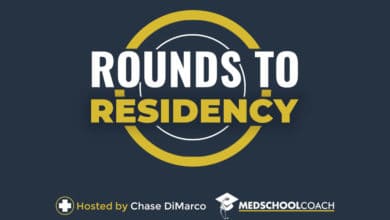Dr. Stephen Beeson, family medicine physician and two-time best-selling author, discusses clinician excellence and the core competencies important for medical students in the clinic.
- [00:51] How Dr. Beeson Is Changing Medicine for the Better
- [01:41] Clinician Excellence and What It Entails
- [05:06] Establishing Patient Trust and Connectivity
- [11:39] How to be a Good Colleague
- [16:42] Proper Utilization of Tools and Resources
- [23:13] Dr. Beeson’s Advice to Medical Students and Residents
Today Chase DiMarco talks to Dr. Stephen Beeson, family medicine physician and two-time best-selling author. Passionate about clinician well-being and development, he founded an app called The Clinician Experience Project. It is a learning platform that provides skills training and coaching so that doctors can deliver exceptional patient care. Chase and Dr. Beeson discuss clinician excellence and the core competencies involved.
Practicing Clinician Excellence
The Accreditation Council for Graduate Medical Education (ACGME) has a list of competencies and milestones that every doctor should be able to achieve. Aside from medical knowledge and skills, students and residents do not receive formal training on other competencies like patient care, professionalism, and interpersonal skills. Doctors may know these concepts in theory, but not in practice. Soft skills are also essential for physician success and work environment culture.
Patient Trust and Connectivity
Several studies have shown that knowing how to interact with patients is significant in improving treatment outcomes. You need to have good rapport and clinical skills in order to treat patients effectively. Most of the time, residents are too caught up in making a diagnosis that they forget to express sympathy and concern.
To improve patient interaction, doctors must make patients feel heard and cared about. Listen to their anecdotes without interruption. Acknowledge their feelings and situation. Show them that you are actively listening. Patients must also feel confident in your skills as a clinician. Lastly, they want to feel included in the discussion of their treatment.
The first step to providing better patient care is awareness. Now that you know the importance of establishing patient trust, you are more likely to make a conscious effort to get better at it. Remember, patients assess doctors not just on their medical skills but also on how you make them feel.
Professionalism, Interpersonal and Communication Skills
In order to thrive in a group environment, physicians must have good interpersonal and communication skills. Doctors must be open and respectful not only to their colleagues, but also to nurses and the rest of the staff. An intimidating physician can comprise the culture of safety. The staff might become unwilling to point out mistakes because they cannot approach the doctor.
Dr. Beeson recommends doing these 3 tasks to become a better colleague. The first thing that you can do is to give good referrals. Do the necessary work by asking specific questions and following guidelines. When the specialist receives the referral, he/she is up to speed with the patient’s background and condition. Second, speak highly about your fellow doctors. Put the patient at ease by complimenting your colleagues when you make or receive referrals. Finally, you can be a good co-worker by simply being there for others. Supporting each other helps prevent physician burnout.
Proper Utilization of Tools and Resources
There is no direct correlation between treatment costs and improved treatment outcomes. Expensive care does not always mean better care. In some cases, excessive treatments can do more harm than good. Part of being a great clinician is utilizing tools and resources effectively to alleviate the cost burden on patients.
One way to do this is by allowing patient participation. Patients will tend to prefer affordable options. Doctors should listen to their ideas and goals when prescribing care. On the other hand, sometimes it is the patients who would request for unnecessary tests. Physicians should know how to negotiate with patients instead of butting heads with them. If you would like more resources, check out the Choosing Wisely campaign that advocates for discussion about unnecessary medical treatment and procedures.
Dr. Beeson’s Advice to Medical Students and Residents
Becoming a doctor is an extraordinary experience. The ability to impact a patient’s life is so fulfilling. Don’t let naysayers dissuade you from continuing your medical journey. It will take time to become a great clinician. Be prepared to be a lifelong learner. Don’t just focus on improving medical knowledge and skills, but also improve on the other core competencies expected of you.
Learn more about the Clinician Experience Project on its website. Check out Dr. Beeson’s best selling books Practicing Excellence and Engaging Physicians. Reach out to him at stephen@practicingexcellence.com.
Sign up for a Free Coaching session with Chase DiMarco, sponsored by Prospective Doctor! You can also join the Med Mnemonist Mastermind FB Group today and learn more about study methods, memory techniques, and MORE! Do check out Read This Before Medical School. Like our FreeMedEd Facebook page and find our Medical Micro Course, Blog posts, and Podcasts at FreeMedEd.org! Feel free to Email any Questions or Comments.
